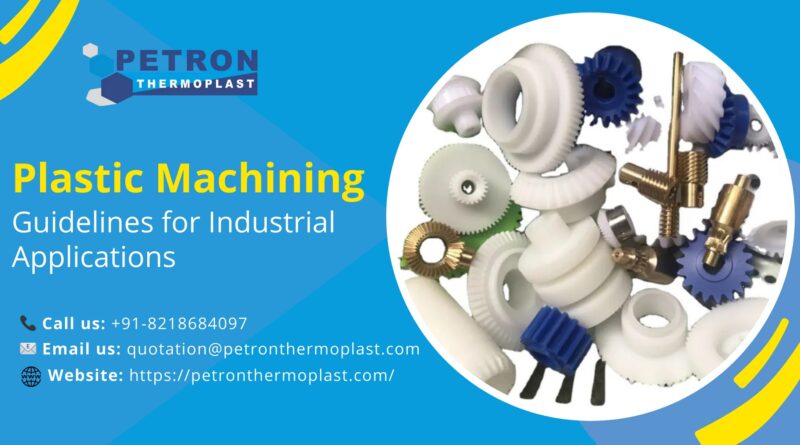Plastic Machining Guidelines for Industrial Applications
Plastic machining has become an essential process in various industries, including automotive, aerospace, medical devices, and electronics. As high-performance plastics continue to replace traditional materials like metal, understanding the intricacies of plastic machining is crucial for ensuring precision, efficiency, and durability in industrial applications. This article provides comprehensive guidelines to help you navigate the complexities of plastic machining and achieve optimal results in your projects.

Material Selection: The Foundation of Success
Selecting the right plastic material is the first and most critical step in any machining project. Different plastics have unique properties, such as hardness, thermal stability, and chemical resistance, which influence their machinability. Commonly used plastics in industrial machining include:
- PEEK (Polyetheretherketone): Known for its excellent thermal stability and mechanical properties, PEEK is ideal for high-stress applications.
- PTFE (Polytetrafluoroethylene): PTFE offers exceptional chemical resistance and a low coefficient of friction, making it suitable for non-stick and high-temperature environments.
- Nylon: This versatile plastic is known for its strength, toughness, and resistance to wear, making it ideal for gears and bearings.
- Acrylic: Acrylic is often chosen for its optical clarity and ease of machining, making it suitable for applications requiring transparency.
Understanding the material’s properties and how they affect machining processes is key to achieving precise and reliable results.
Tool Selection: Tailoring to Plastic Properties
Plastic machining requires specialized tools that differ from those used in metal machining. The right tool selection ensures minimal material deformation, improved surface finish, and extended tool life. Here are some considerations:
- Tool Material: Carbide and diamond-coated tools are preferred for their durability and ability to maintain sharpness when cutting plastics.
- Tool Geometry: Sharp cutting edges and positive rake angles reduce heat generation and prevent melting or warping of the plastic.
- Tool Coatings: Applying coatings like TiN (Titanium Nitride) can reduce friction and enhance tool performance, especially in high-speed applications.
Selecting the appropriate tools based on the specific plastic material and machining process is crucial for achieving desired outcomes.

Machining Techniques: Precision and Care
Plastic machining differs from metal machining in several key aspects. Understanding these differences is vital to avoid common pitfalls such as material melting, excessive burr formation, and dimensional inaccuracies. Here are some machining techniques to consider:
- Cutting Speeds: Plastics require lower cutting speeds compared to metals to prevent overheating and melting. However, speeds should be adjusted based on the specific plastic material.
- Feed Rates: Lower feed rates are recommended to minimize heat buildup and ensure a smooth surface finish.
- Coolant Use: Unlike metals, plastics do not always require coolants. When used, coolants should be carefully selected to avoid chemical reactions or material degradation.
- Chip Removal: Effective chip removal is essential to prevent material buildup and potential damage to the workpiece. Vacuum systems or air blasts can be employed to clear chips efficiently.
Adapting machining techniques to the unique properties of plastics helps maintain dimensional accuracy and surface quality.
Quality Control: Ensuring Precision and Consistency
In industrial applications, maintaining tight tolerances and high-quality standards is critical. Implementing rigorous quality control measures throughout the machining process ensures consistent results. Consider the following practices:
- Dimensional Inspection: Regularly inspect the machined parts using precision measuring instruments like calipers and micrometers to ensure they meet the required tolerances.
- Surface Finish Assessment: Evaluate the surface finish of the machined plastic using profilometers or visual inspection to detect any imperfections or defects.
- Material Testing: Conduct material tests, such as tensile strength or hardness testing, to verify that the machined parts meet the desired mechanical properties.
By prioritizing quality control, you can achieve reliable and high-performance plastic components for industrial applications.
Post-Machining Considerations: Finishing and Assembly
After machining, additional steps may be required to prepare the plastic components for final use. These may include:
- Deburring: Removing burrs and sharp edges using mechanical or manual methods to ensure safety and proper fit during assembly.
- Polishing: For applications requiring a high-quality surface finish, polishing techniques such as buffing or flame polishing can be employed.
- Joining Methods: Plastics can be joined using various techniques, including welding, adhesive bonding, or mechanical fastening. The choice of method depends on the material properties and the intended application.
Careful attention to post-machining processes ensures that the final plastic components meet the functional and aesthetic requirements of industrial applications.

Conclusion
Plastic machining is a specialized field that requires a deep understanding of material properties, tool selection, machining techniques, and quality control measures. By following these guidelines, you can achieve precision, efficiency, and durability in your industrial plastic machining projects. As the demand for high-performance plastics continues to grow, mastering these machining practices will position you at the forefront of innovation in various industries.
When it comes to plastic machining, precision, reliability, and expertise are key. Petron Thermoplast brings all these qualities and more to every project, making them a trusted partner for industries that rely on high-performance plastic components. By choosing Petron Thermoplast, you’re not just getting machined parts—you’re gaining a partner dedicated to delivering the best solutions for your specific needs.
Discover the difference that expert plastic machining can make for your industrial applications. Contact Petron Thermoplast today to learn more about their services and how they can help you achieve your project goals.

